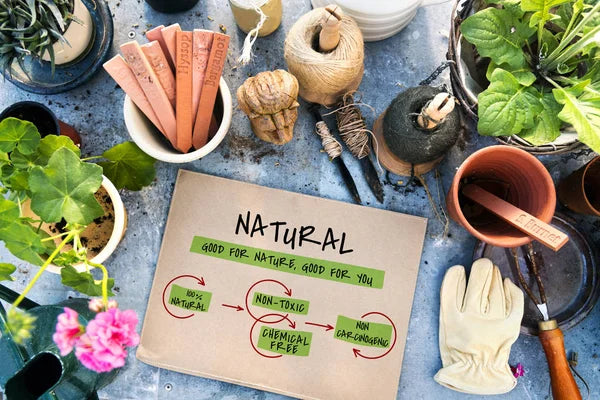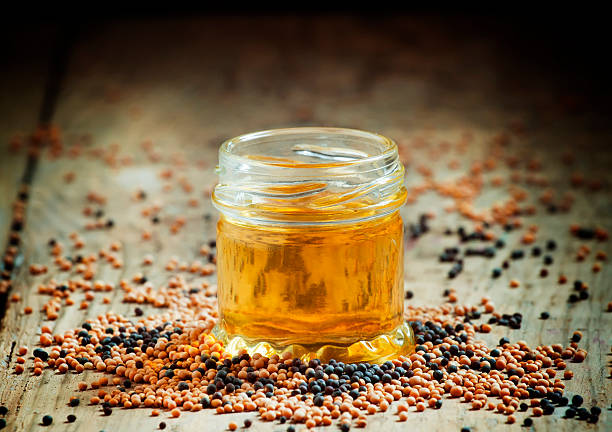Why Choose Chemical- & Preservative-Free Formulas: An Ayurvedic View

What Does Ayurveda Say About Artificial Chemicals and Preservatives?
Your body recognises natural nourishment, not synthetic shortcuts. That’s why Ayurveda warns against preservatives and artificial chemicals.
Ayurveda emphasizes wholesome, fresh, and unadulterated food as the foundation of health. In this system, food is more than nutrition; it carries prana, the life force. Preserved and canned foods, packed with artificial preservatives and chemicals, lack this vitality.
-
Synthetic substances are classified as unnatural and incompatible with agni (digestive fire).
-
Non-natural additives disturb digestion, preventing food from being properly metabolized.
-
Chemicals → Weak digestion → Ama formation: Ayurveda sees artificial preservatives as contributing to ama (toxins), the sticky residue that blocks channels and weakens immunity.
This is why ancient texts discourage consumption of stale, preserved, or artificially treated foods.
How Do Preservatives and Chemicals Affect the Three Doshas?
Each dosha reacts differently to chemical exposure:
-
Vata aggravation: Chemicals such as artificial flavouring agents and MSG create hyperactivity in the nervous system, dryness, anxiety, insomnia, and erratic digestion. Over time, this may trigger Vata-related conditions such as constipation, migraines, and joint issues.
-
Pitta aggravation: Synthetic food colours, refined oils, pesticides, and preservatives create heat and inflammation in the body, aggravating Pitta, leading to acidity, gastritis, skin rashes, liver toxicity, and even precancerous changes.
-
Kapha aggravation: Processed foods heavy in refined flour (maida), preservatives, and flavour enhancers stagnate Kapha, leading to sluggish digestion, obesity, insulin resistance, PCOD, and respiratory allergies.
Even small doses over time can accumulate, subtly disturbing the dosha balance and leading to chronic health concerns.
What Is Ama, and How Do Chemical Substances Increase Toxin Load?
The concept of the body’s “toxic load” refers to the cumulative burden of toxins and harmful substances that can accumulate in the human body over time. These toxins can come from various sources, including environmental pollutants, food choices, lifestyle factors, and even natural metabolic processes.
The body has natural mechanisms, such as the liver and kidneys, that detoxify by metabolizing and eliminating these substances. When the toxic limit is reached, health problems occur. In addition, toxins can be stored in fat and tissues. As a result, losing weight or consuming antioxidants in the future could release toxins into the system. The body will react negatively until the liver and kidneys metabolize and excrete the toxins.
Ama refers to toxins accumulated in your body due to undigested food. It’s believed in Ayurveda that when your digestive energy, or ‘Agni,’ is weak, it can’t fully process food, leading to this toxic residue.
This build-up can affect your overall health, clouding your body’s internal environment and disrupting your natural balance. Understanding how to manage and eliminate ama is critical to maintaining vitality and wellness in Ayurvedic practice.
Understanding Ama
In Ayurveda, understanding “ama” is crucial to comprehending how your body maintains or loses balance and health. Ama forms when the digestive fire, known as Agni, is weak. Agni is responsible for breaking down food into nutrients and energy.
Think of Agni as a fire burning inside you; when it’s strong, it efficiently processes everything you consume, leaving minimal waste. However, it doesn’t fully digest the food when it’s weak—perhaps due to poor diet, inadequate sleep, stress, or other lifestyle factors. As a result, this undigested food turns into ama, a sticky, harmful substance that can accumulate in your body.
This accumulation is more than a minor inconvenience. Ama can clog your channels, disrupting the flow of nutrients and energy and eventually leading to disease. It’s like having a gummed-up engine; your body simply can’t operate smoothly.
By keeping your digestive fire strong, you help prevent the formation of ama. This involves eating the right foods for your body type, maintaining regular eating times, and adopting a lifestyle that supports good digestion and overall health. Recognizing the signs of ama, such as fatigue, sluggishness, and a coated tongue, can help you immediately rebalance your Agni and cleanse your body.
Managing ama is about nurturing your inner fire—your Agni. Doing so ensures that you break down and absorb what’s beneficial while minimizing and eliminating what’s not. According to Ayurvedic principles, this balance is critical to maintaining your health and vitality.
How Do Natural, Preservative-Free Products Support Ayurvedic Wellness?
-
Herbal extracts without preservatives nourish the dhatus without adding toxin load.
-
Plant-based, clean formulations carry natural prana, helping maintain inner balance.
-
Chemical-free formulas are better digested, absorbed, and assimilated — keeping agni strong.
This is why choosing a chemical-free shampoo, soap, toothpaste, or hair oil isn’t just a cosmetic choice; it’s a holistic step toward wellness.
Why Is Ojas Central to Immunity in Ayurveda?
-
Ojas is the finest product of perfect digestion — the essence of all tissues and the foundation of immunity, strength, and mental clarity.
-
Preservative-free living supports ojas formation by keeping agni pure.
-
Chemical exposure blocks the natural conversion of food into ojas, leaving the body depleted and vulnerable.
Strong ojas = resilient immunity, radiant skin, and stable mental energy.
How Do Maharishi Ayurveda’s Chemical-Free Products Align With Classical Texts?
All products from Maharishi Ayurveda reflect the traditional values detailed in Ayurvedic texts such as Ashtang Hridyam and Bhaishajyaratnavali. At the core of these values are the uncompromising emphasis on purity (shuddhata), natural sourcing and compatibility with the body’s inherent intelligence and rhythm.
This adherence to classical purity ensures that every formula remains sattvic (life-supporting), is safe for long-term use, and aligned with Ayurveda’s fundamental goal – that of promoting wellness and health, and healing the sick.
In keeping with the Ayurvedic principle of shuddhata or purity, Maharishi Ayurveda products have the following characteristics:
- No artificial binders, parabens or artificial colours are used in the formulations.
- Instead of harmful chemical, natural preservatives such as ghee, honey and jaggery are used to ensure shelf-life.
- Free of fluoride and SLS; non-foaming.
Here’s a glimpse at the composition of some key products:
Herbal supplements such as Maharishi Ayurveda Amrit Kalash do not contain synthetic preservatives, artificial sweeteners.
The Ayurdent herbal toothpaste is non-foaming and crafted free of fluoride and SLS.
Natural beauty products such as Maharishi Ayurveda Kumkumadi Oil are plant-based and do not contain chemical additives, preservatives and perfumes.
Some products carry COSMOS/BDIH Natural Certification; and the Natural/COSMOS seal claimed in certain markets.
What Are the Risks of Long-Term Use of Preservative-Loaded Products?
Modern science and Ayurveda both caution against chronic chemical exposure:
-
Digestive system: Preservatives weaken metabolism and cause bloating, acidity, or sluggish bowels.
-
Hormonal balance: Artificial compounds mimic endocrine disruptors, leading to fertility issues and metabolic disorders.
-
Nervous system: Over time, chemicals can increase mental fog, anxiety, and insomnia.
-
Skin & immunity: Sensitive groups (children, elderly) with weak agni are particularly vulnerable to rashes, allergies, and low immunity.
Several peer-reviewed studies have highlighted the harmful effects of preservatives:
A 2019 study in the Journal of Food Science and Technology found that common food-grade preservatives used in herbal products may disrupt gut microbiota and provoke inflammatory reactions.
A toxicology review by the Indian Journal of Pharmacology (2020) noted that even permitted levels of benzoates, when consumed regularly, can cause mitochondrial dysfunction and oxidative stress.
According to Dr. David Heber (UCLA Center for Human Nutrition), "Preservatives, although safe in isolated doses, may bioaccumulate and trigger chronic disease pathways."
Ayurveda teaches Ahara (food/medicine) should be as alive as possible. A preserved product is already devoid of prana, and its long-term use may burden agni (digestive fire), produce ama (toxins), and compromise ojas (vitality).
What Lifestyle Practices Complement a Chemical-Free Approach in Ayurveda?
Going chemical-free isn’t limited to personal care products. Ayurveda recommends:
-
Daily Abhyanga (oil massage) with natural oils to detoxify and pacify doshas.
-
Panchakarma therapies to eliminate stored toxins.
-
Satvik diet rich in fresh, seasonal, preservative-free foods.
-
Using natural alternatives: Chemical free shampoo, toothpaste, soap, and oils for everyday rituals.
These practices reduce toxin exposure, strengthen agni, and support ojas — leading to long-term wellness.
Are there natural preservatives allowed in Ayurvedic medicine?
Officially Recognized (per Ayurvedic Pharmacopoeia of India, GMP, and API Formulary)
The official pharmacopeial standards (API, Part I–VI) and GMP guidelines don’t recommend synthetic preservatives but acknowledge certain natural stabilizers and carriers traditionally used:
-
Madhu (Honey) – antimicrobial, antioxidant .Honey carries and preserves the qualities of drugs.
-
Sharkara (Sugar), Guda (Jaggery) – natural sweeteners, stabilize Avalehas and Rasayanas.
-
Ghrita (Ghee), Taila (Oils) – act as carriers, prevent oxidation.
Asava–Arishta (Self-generated alcohol from fermentation) – acts as a preservative in liquid formulations.
-
Saindhava Lavana (Rock Salt) – used in some formulations for stability.
Is it possible to fully avoid synthetic substances in modern life?
Almost impossible, but we reduce or minimize it by making mindful choices-
-
Eating whole, organic foods.
-
Choosing natural fabrics like cotton, wool, or linen.
-
Using herbal or Ayurvedic products for self-care.
-
Filtering drinking water and improving indoor air quality.
-
Avoiding single-use plastics and synthetic additives where possible.
Conclusion
In Ayurveda, the path to wellness is not about short-term convenience but long-term balance. Artificial preservatives and chemicals may extend shelf life, but they weaken agni, form ama, and block the flow of ojas — the very essence of immunity and vitality. Over time, these substances disrupt the three doshas and burden the body with toxins, leading to sluggish digestion, low energy, and chronic ailments.
On the other hand, chemical-free and preservative-free formulations honor the Ayurvedic principles of purity, freshness, and nourishment. From chemical-free shampoo and hair oil that protects scalp health to chemical-free toothpaste and soaps that cleanse without toxins, every choice you make has the power to protect your inner harmony.
By opting for Maharishi Ayurveda’s chemical-free range, you align with classical Ayurvedic wisdom and safeguard your body from unnecessary toxin load. Combine these products with a satvik diet, mindful living, and seasonal detox practices, and you’ll create a lifestyle that supports strong digestion, vibrant immunity, and lasting well-being.
FAQs
1. Why does Ayurveda discourage the use of preservatives?
Ayurveda views preservatives as incompatible with Agni (digestive fire). They hinder digestion, contribute to Ama (toxins), and weaken Ojas (vital immunity essence).
2. Can chemical-free products really make a difference?
Yes. Chemical-free, preservative-free products carry natural Prana (life force), improve digestion, and support the body’s natural detox pathways, making them safer for long-term use.
3. How do artificial chemicals affect the three doshas?
-
Vata: Triggers dryness, anxiety, insomnia, constipation.
-
Pitta: Increases acidity, rashes, liver toxicity.
-
Kapha: Causes sluggishness, obesity, PCOD, allergies.
4. Are there natural preservatives used in Ayurveda?
Yes. Classical texts mention honey, jaggery, ghee, oils, and natural fermentation as stabilizers. These maintain product safety without harming Agni or Ojas.
5. Is it realistic to go fully chemical-free today?
While it’s difficult to avoid all synthetic exposure, conscious choices—like using Ayurvedic personal care, eating seasonal foods, and living satvik—significantly reduce toxin load.
Popular Posts

Choosing the Right Detox Based on Your Ayurvedic Body Type
30 Jan, 2026The fundamental truth of the human condition is that no two bodies function the same way. Based o...
Read more
Ayurvedic Detox Diet Tips and Recipes You Can Easily Make at Home
29 Jan, 2026In Ayurveda, detoxification is the process of digesting or eliminating accumulated toxins or ama ...
Read more
Foods That Support Detox According to Ayurveda
28 Jan, 2026In Ayurveda, food is the primary source of prana, the vital life energy that sustains the body, m...
Read more




 Popular Read
Popular Read

















































